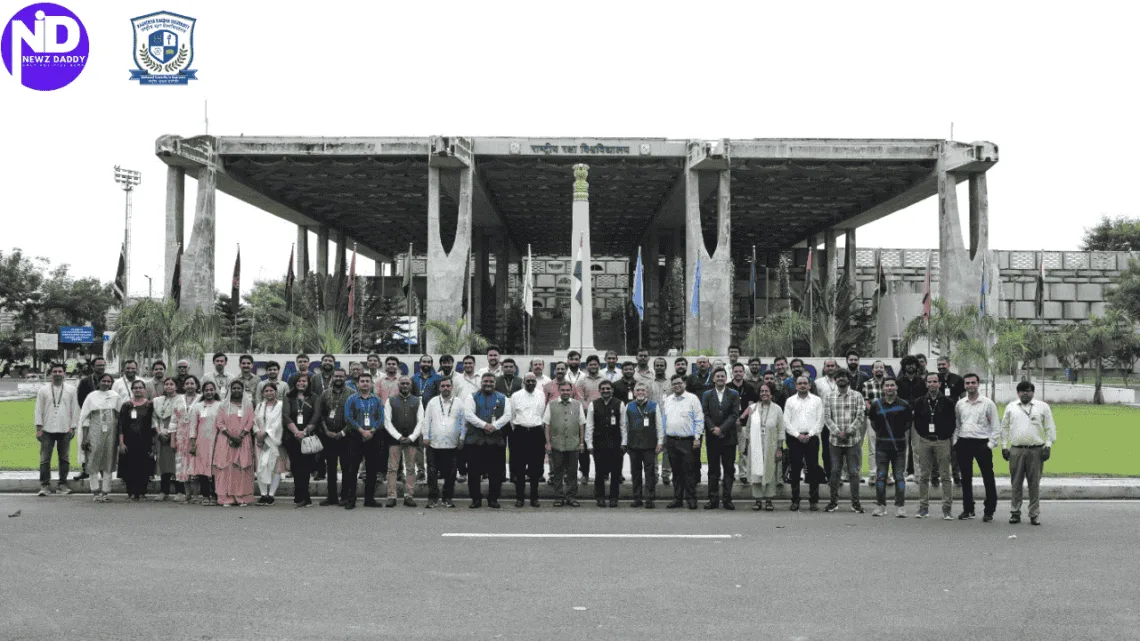NSCS, ISRO and RRU Jointly Organised Cyber Security Training
Newz Daddy Educational Updates
Gandhinagar, Gujarat – To enhance cyber resilience in India’s space sector, ISRO, DOS, NSCS, and SITAICS of Rashtriya Raksha University (RRU) jointly organised a specialised cybersecurity residential training program for 40 ISRO/DOS Scientists and Engineers.
This comprehensive training program equipped participants with advanced competencies and essential knowledge to safeguard the organisation’s digital infrastructure against emerging cyber threats. Today, the space industry depends heavily on secure communication and satellite systems. Even a small cyber-attack can disturb national security, GPS, or satellite launches. That is why such training is considered vital. India’s space sector, led by ISRO, is among the fastest-growing in the world, and protecting it from hackers is a top priority.
With a strong focus on hands-on learning, the sessions provided practical exposure that enabled participants to develop actionable skills and real-world strategies to effectively counter the dynamic and evolving cybersecurity landscape. Hands-on training is important because theory alone cannot prepare professionals for fast-changing cyber challenges. Cybercriminals now use Artificial Intelligence (AI), phishing campaigns, and ransomware to attack sensitive organisations. By practising real-life scenarios, scientists and engineers can respond faster and prevent damage.
A high-level hybrid interaction session was organised during the program, featuring distinguished visionary leaders, including Dr. V. Narayanan, Chairman, ISRO / Secretary, DOS, Shri. Nilesh Desai, Director, SAC, Shri. M. Ganesh Pillai, Scientific Secretary, ISRO, Shri. Narendra Nath G., Joint Secretary, NSCS, and Shri. Rajiv Chetwani, Chief Information Security Officer (CISO), ISRO/DOS. Each dignitary shared insights on the evolving landscape of cybersecurity, APT, Quantum communication, and its strategic relevance to space technology and national development.
Advanced Persistent Threats (APT) are one of the most dangerous forms of cyber-attacks. They are carried out by highly skilled attackers, often linked to state-sponsored groups. They target critical sectors like defence and space, stealing data over long periods without detection. The discussion also covered quantum communication, a future technology that uses the principles of quantum physics to make communication unbreakable. India has already made big progress in this area, with ISRO successfully demonstrating quantum key distribution in 2021. Such advancements ensure that sensitive data in satellites and defence systems remain secure.
Prof. Anil Bhardwaj, Director, PRL, Dr. Lokesh Garg, DG, NCIIPC, Prof. Kalpesh Wandra, Pro-VC, RRU, Shri. D. K. Patel, Group Director, SAC, Dr. Jatin Patel, Project Director (I/C), RRU, Shri. Samuel Johnson, Deputy Director (Cyber Security), ISRO HQ, Shri. Jigar Raval, Deputy CISO, ISRO/DOS, Members of Local Organising Committee and other esteemed ISRO/DOS senior officials graced the interaction session. Their presence highlighted the importance of academic, research, and governmental collaboration in securing India’s digital frontiers. Institutions like PRL and NCIIPC play a central role in research and protection of critical infrastructure, ensuring a multi-layered approach to cybersecurity.
The session concluded with a vote of thanks delivered by Mr. Jigar Raval, Deputy CISO, ISRO/DOS, acknowledging the visionary leadership and collaborative efforts of NSCS, ISRO, and RRU. The joint effort between national security agencies, scientific organisations, and universities shows India’s commitment to building a cyber-secure ecosystem for the future.






